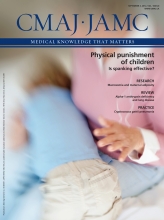The board of the Association of Academic Professionals in Obstetrics and Gynaecology (APOG, formerly the Association of Professors of Obstetrics and Gynaecology of Canada) wishes to respond to the CMAJ article by Gibson and Downie,1 which revisits the issue of consent prior to pelvic examination. As the academic organization responsible for support for the academic missions in undergraduate and postgraduate training in obstetrics and gynecology, we have serious concerns.
“Medical trainees” was changed to “medical students” in the revised guidelines,2 which identifies the medical student’s role in pelvic examination as a learner. The new document is patient-focused and clearly defines informed consent on the part of the medical student and the entire gynecologic surgical team. The document ensures that patients are fully informed about the medical student’s role as a learner during clinical care and that patients may opt out of being a participant in the teaching of pelvic examination skills.
Gibson and Downie1 expressed concerns about the comprehensiveness of the guideline with regard to the exclusion of residents as medical trainees. Residents are physicians who are qualified medical practitioners and are deemed to have developed their pelvic examination skills to the point where they are able perform them independently — as well as offer supervision to learners. Residents are employed under contract by provincial bodies responsible for residency programs. Under ethical obligations set down by provincial governing bodies, qualified physician residents provide care only with patient consent. Residents certainly continue to learn and acquire experience as do all obstetrician–gynecologists who have already completed their training. The principle of lifelong learning is important for all physicians.
Our Association welcomes input and membership from all interested stakeholders including those from the legal community. We strive to achieve the best possible care for women in the academic environment, while fulfilling our commitment to ensure all health professionals providing care for women are adequately trained. Ideally, this should be carried out in a safe environment for both the learner and the patient without needlessly raising anxiety in the public and putting the clinical academic process in jeopardy. A collaborative approach between legal colleagues and physicians would be much more productive toward achieving this goal.











